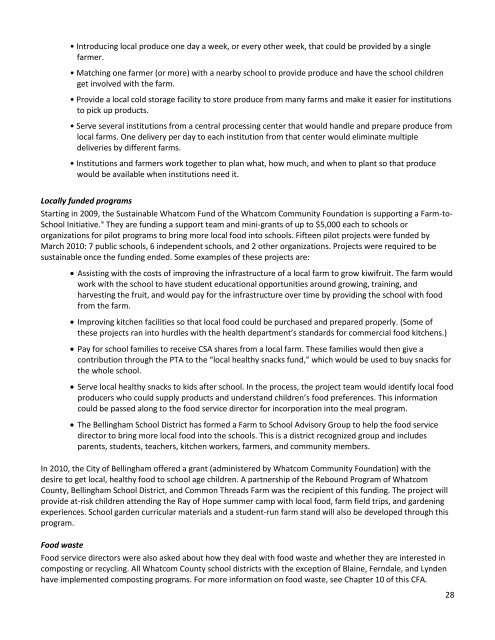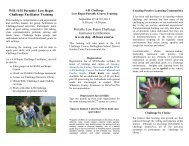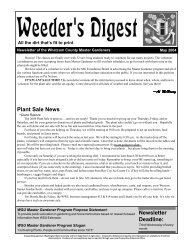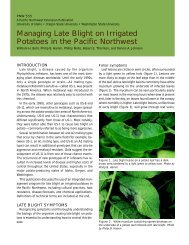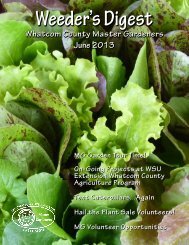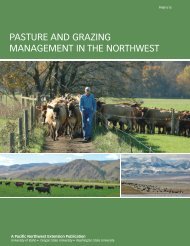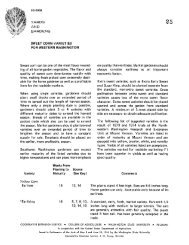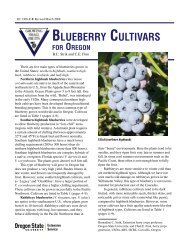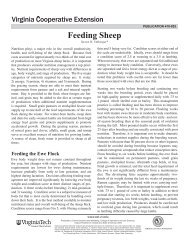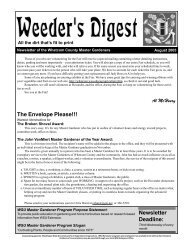Where Does Whatcom County Get its Food? - WSU Whatcom ...
Where Does Whatcom County Get its Food? - WSU Whatcom ...
Where Does Whatcom County Get its Food? - WSU Whatcom ...
You also want an ePaper? Increase the reach of your titles
YUMPU automatically turns print PDFs into web optimized ePapers that Google loves.
• Introducing local produce one day a week, or every other week, that could be provided by a single<br />
farmer.<br />
• Matching one farmer (or more) with a nearby school to provide produce and have the school children<br />
get involved with the farm.<br />
• Provide a local cold storage facility to store produce from many farms and make it easier for institutions<br />
to pick up products.<br />
• Serve several institutions from a central processing center that would handle and prepare produce from<br />
local farms. One delivery per day to each institution from that center would eliminate multiple<br />
deliveries by different farms.<br />
• Institutions and farmers work together to plan what, how much, and when to plant so that produce<br />
would be available when institutions need it.<br />
Locally funded programs<br />
Starting in 2009, the Sustainable <strong>Whatcom</strong> Fund of the <strong>Whatcom</strong> Community Foundation is supporting a Farm-to-<br />
School Initiative. ix They are funding a support team and mini-grants of up to $5,000 each to schools or<br />
organizations for pilot programs to bring more local food into schools. Fifteen pilot projects were funded by<br />
March 2010: 7 public schools, 6 independent schools, and 2 other organizations. Projects were required to be<br />
sustainable once the funding ended. Some examples of these projects are:<br />
Assisting with the costs of improving the infrastructure of a local farm to grow kiwifruit. The farm would<br />
work with the school to have student educational opportunities around growing, training, and<br />
harvesting the fruit, and would pay for the infrastructure over time by providing the school with food<br />
from the farm.<br />
Improving kitchen facilities so that local food could be purchased and prepared properly. (Some of<br />
these projects ran into hurdles with the health department’s standards for commercial food kitchens.)<br />
Pay for school families to receive CSA shares from a local farm. These families would then give a<br />
contribution through the PTA to the “local healthy snacks fund,” which would be used to buy snacks for<br />
the whole school.<br />
Serve local healthy snacks to kids after school. In the process, the project team would identify local food<br />
producers who could supply products and understand children’s food preferences. This information<br />
could be passed along to the food service director for incorporation into the meal program.<br />
The Bellingham School District has formed a Farm to School Advisory Group to help the food service<br />
director to bring more local food into the schools. This is a district recognized group and includes<br />
parents, students, teachers, kitchen workers, farmers, and community members.<br />
In 2010, the City of Bellingham offered a grant (administered by <strong>Whatcom</strong> Community Foundation) with the<br />
desire to get local, healthy food to school age children. A partnership of the Rebound Program of <strong>Whatcom</strong><br />
<strong>County</strong>, Bellingham School District, and Common Threads Farm was the recipient of this funding. The project will<br />
provide at-risk children attending the Ray of Hope summer camp with local food, farm field trips, and gardening<br />
experiences. School garden curricular materials and a student-run farm stand will also be developed through this<br />
program.<br />
<strong>Food</strong> waste<br />
<strong>Food</strong> service directors were also asked about how they deal with food waste and whether they are interested in<br />
composting or recycling. All <strong>Whatcom</strong> <strong>County</strong> school districts with the exception of Blaine, Ferndale, and Lynden<br />
have implemented composting programs. For more information on food waste, see Chapter 10 of this CFA.<br />
28


